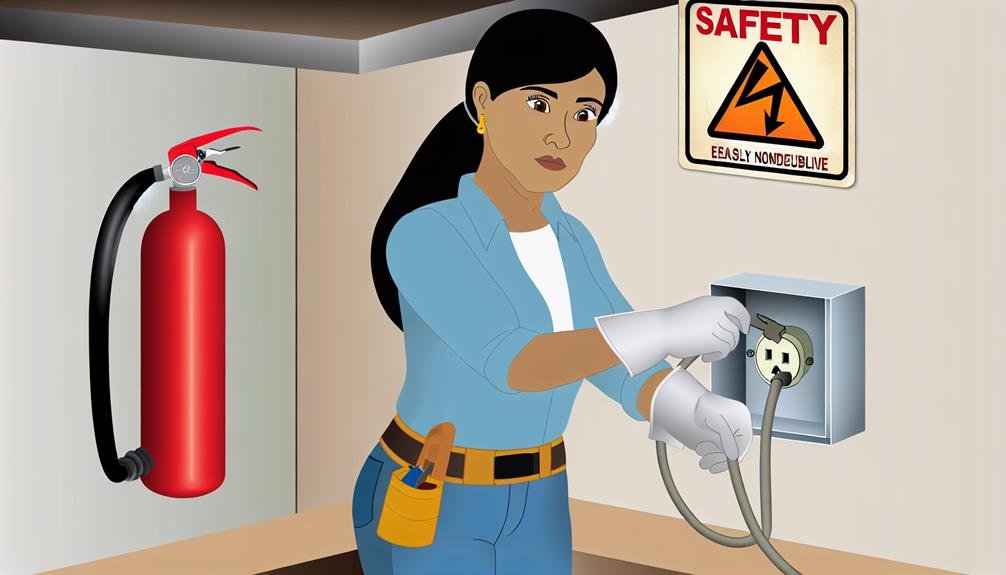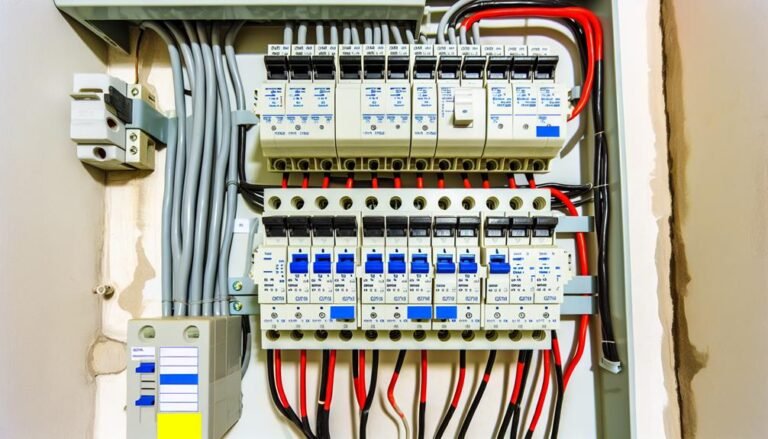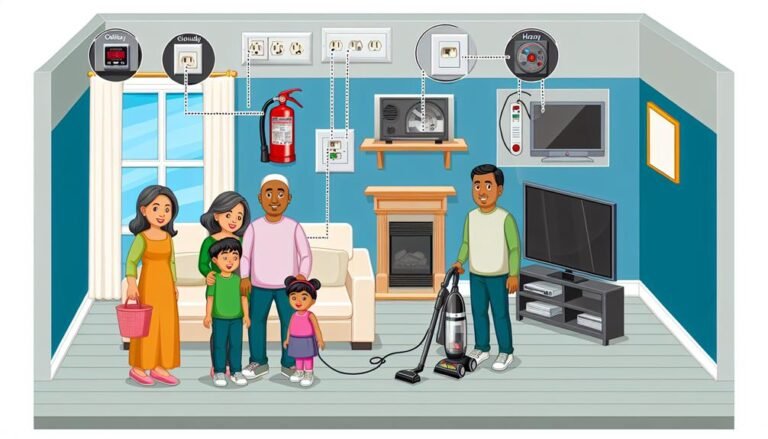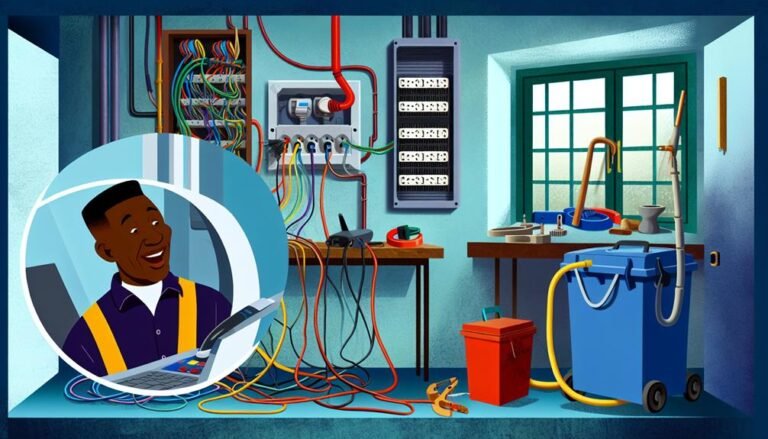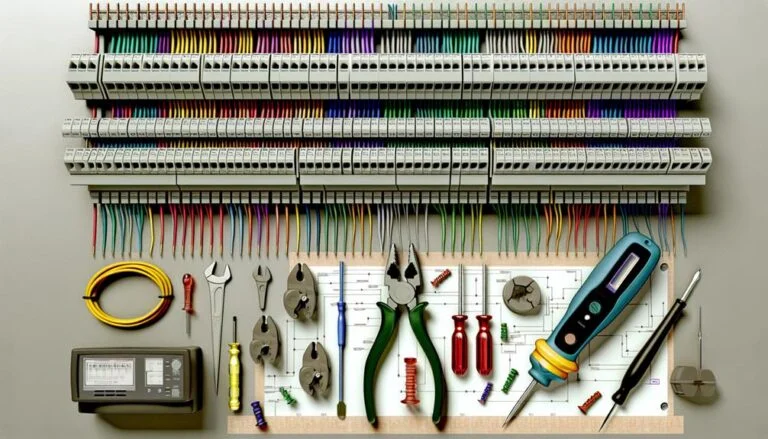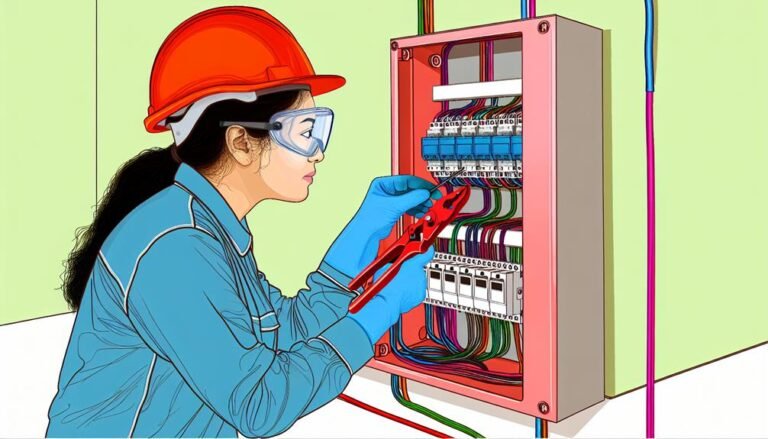Did you know that electrical accidents account for approximately 4,000 injuries and 370 deaths each year in the United States alone? It's a startling statistic that highlights the importance of electrical safety in our daily lives.
But fear not, for there are simple yet effective measures you can take to prevent such accidents from happening. From using ground fault circuit interrupters to properly maintaining your electrical appliances, these eight tips will help you create a safer environment for yourself and your loved ones.
So, are you ready to ensure the well-being of your home and the people in it?
Key Takeaways
- Install GFCIs in areas with water to protect against electric shocks and potential fires.
- Regularly check electrical outlets for signs of wear and tear and have them inspected and repaired by a qualified electrician if necessary.
- Inspect cords for damage and replace them immediately to prevent electrical shorts, sparks, or fires.
- Use surge protectors to prevent electrical surges from damaging sensitive electronics and replace them if they are no longer functioning properly.
Use Ground Fault Circuit Interrupters (GFCIs)
To prevent electrical accidents, it's highly recommended that you use Ground Fault Circuit Interrupters (GFCIs). These electrical safety equipment are designed to protect you from electric shocks and potential fires by quickly shutting off the power supply when they detect a ground fault. GFCIs are particularly important in areas where water is present, such as kitchens, bathrooms, and outdoor outlets.
Using GFCIs isn't just a matter of plugging them in. Proper installation is crucial to ensure their effectiveness. It's imperative that you have GFCIs professionally installed by a qualified electrician. They'll ensure that the GFCIs are correctly wired and connected to the appropriate circuits. Professional installation guarantees that the GFCIs are functioning optimally, providing you with the highest level of safety.
While it may be tempting to try installing GFCIs yourself, it's crucial to understand that incorrect installation can render them useless and put you at risk. Only a professional electrician possesses the knowledge and expertise to install GFCIs correctly and safely. Don't compromise your safety by attempting a DIY installation.
Avoid Overloading Electrical Outlets
Overloading electrical outlets can pose serious risks to your safety, so it's crucial to be mindful of the number of devices and appliances you plug into them. Electrical outlet safety is essential for preventing electrical fires and other hazards in your home or workplace.
To avoid overloading electrical outlets, start by using power strips or surge protectors. These devices allow you to plug in multiple appliances while distributing the electrical load evenly. Be sure to choose a power strip or surge protector that has a built-in circuit breaker to prevent overloading.
Next, be cautious of how many high-energy appliances you plug into a single outlet. Devices such as space heaters, air conditioners, and refrigerators consume a lot of power and can overload an outlet if used simultaneously. Spread these appliances across different outlets or use dedicated circuits for them.
Regularly check the condition of your electrical outlets. Loose or damaged outlets can increase the risk of overloading and electrical fires. If you notice any signs of wear and tear, such as loose plugs or scorch marks, immediately contact a qualified electrician to inspect and repair the outlet.
Regularly Inspect and Replace Damaged Cords
Regularly inspecting and replacing damaged cords is crucial for maintaining electrical safety in your home or workplace. Inspecting cords on a regular basis helps identify any signs of wear and tear, such as frayed or exposed wires, cracked insulation, or loose connectors. These issues can lead to electrical shorts, sparks, or even electrical fires if left unaddressed.
To inspect cords, start by checking the plug for any signs of damage or loose prongs. Then, run your hand along the entire length of the cord, feeling for any abnormalities like cuts, nicks, or bulges. If you come across any damaged areas, it's important to replace the cord immediately.
When replacing damaged cords, be sure to choose the right type and length for your specific needs. Make sure the replacement cord is rated for the appropriate voltage and current capacity. Additionally, ensure that the new cord is properly installed and securely connected to the device and power source.
Keep Water Away From Electrical Appliances
Keep water away from electrical appliances to prevent potential accidents. Water and electricity don't mix well, and coming into contact with water can lead to electric shocks or even electrocution. To ensure the safety of yourself and others, follow these tips:
- Use waterproof electrical appliances: When using electrical appliances in areas where water is present, such as the kitchen or bathroom, make sure they're specifically designed to be waterproof. These appliances have additional safety features to protect against water-related accidents.
- Keep appliances away from water sources: Avoid placing electrical appliances near sinks, bathtubs, or any other water sources. Accidental spills or splashes can easily come into contact with the appliance and cause a dangerous situation.
- Ensure proper grounding: Grounding is essential for electrical safety. Make sure all appliances are properly grounded to prevent electrical shocks. If you're unsure about the grounding of an appliance, consult a professional electrician.
- Practice safe storage of electrical cords: When not in use, neatly coil and store electrical cords away from water sources. Avoid placing them on wet surfaces or near water containers to minimize the risk of water exposure.
Use Surge Protectors for Sensitive Electronics
To further safeguard your electrical appliances and prevent potential accidents, it's crucial to utilize surge protectors for your sensitive electronics. Surge protectors offer numerous benefits that can help protect your valuable devices and ensure their longevity.
One of the main benefits of surge protectors is their ability to prevent electrical surges from damaging your electronics. Electrical surges, which are sudden increases in electrical voltage, can occur due to lightning strikes, power outages, or even faulty wiring. These surges can cause irreparable damage to sensitive electronic components, leading to costly repairs or replacements. By using surge protectors, you can divert excess voltage away from your devices, effectively shielding them from potential harm.
There are different types of surge protectors available in the market, each designed to cater to specific needs. The most common type is the power strip surge protector, which allows you to plug multiple devices into a single power source while offering surge protection. Other types include wall-mounted surge protectors and whole-house surge protectors, which provide protection for your entire electrical system.
When selecting a surge protector, it's essential to consider its joule rating, which indicates its capacity to absorb excess voltage. Higher joule ratings offer better protection. Additionally, look for surge protectors with indicator lights, which can alert you if the device is still providing surge protection.
Practice Safe Plug and Cord Handling
To ensure your safety and protect your electrical devices, it's important to handle plugs and cords responsibly. Follow these tips to practice safe plug and cord handling:
- Properly store cords: Avoid leaving cords in a tangled mess or coiled tightly. Instead, loosely coil them and secure them with a Velcro strap or tie. This prevents damage to the cords and reduces the risk of tripping hazards.
- Avoid DIY electrical work: Unless you're a qualified electrician, it's best to leave electrical work to the professionals. Attempting to fix or install electrical outlets, switches, or wiring yourself can lead to serious accidents or fires. Always consult a licensed electrician for any electrical work in your home.
- Check for frayed or damaged cords: Regularly inspect your cords for any signs of damage, such as fraying or exposed wires. If you notice any issues, replace the cord immediately. Using damaged cords can result in electric shocks or fires.
- Use surge protectors: To protect your electronic devices from power surges, use surge protectors with built-in circuit breakers. These devices help prevent damage to your devices and reduce the risk of electrical accidents.
Properly Maintain Electrical Appliances
Properly maintaining electrical appliances is crucial for their longevity and your safety. Regular maintenance not only helps to extend the lifespan of your appliances but also reduces the risk of electrical accidents.
To ensure appliance safety, it's important to follow a few key steps for electrical maintenance.
Firstly, always read and follow the manufacturer's instructions for maintenance. They provide valuable information on how to clean, inspect, and service your appliances. Regularly cleaning appliances, such as removing dust and debris from vents and filters, can prevent overheating and potential electrical fires.
Secondly, inspect cords and plugs for any signs of wear or damage. Frayed wires or loose plugs can pose a serious risk of electrical shock or fire. If you notice any issues, it's crucial to repair or replace the cords or plugs immediately. Additionally, avoid overloading sockets by using extension cords or power strips. Overloading can lead to overheating and cause electrical accidents.
Lastly, consider scheduling professional maintenance for complex appliances like air conditioners or refrigerators. Regular servicing by qualified technicians can identify and address any potential electrical issues before they become hazardous.
Educate Yourself and Your Family on Electrical Safety
Ensure the safety of yourself and your family by educating them on electrical safety. Electrical safety education is crucial in order to prevent accidents and protect your loved ones. Here are four important reasons why you should prioritize electrical safety training:
- Awareness: By educating yourself and your family about electrical safety, you'll increase your awareness of potential hazards and how to avoid them. This knowledge will empower you to make informed decisions when it comes to using electrical appliances and handling electrical systems.
- Risk reduction: Electrical safety training reduces the risk of electrical accidents occurring in your home. By understanding the proper handling and maintenance of electrical devices, you can significantly decrease the chances of electrical shocks, fires, and other accidents.
- Emergency preparedness: Knowing how to respond to electrical emergencies is essential. Electrical safety education equips you with the necessary skills to handle situations such as electrical fires and power outages safely and effectively, minimizing damage and ensuring the well-being of everyone involved.
- Peace of mind: By educating yourself and your family on electrical safety, you can have peace of mind knowing that you have taken proactive measures to safeguard your home and loved ones from potential electrical hazards.
Don't underestimate the importance of electrical safety training. Empower yourself and your family with the knowledge to prevent electrical accidents and promote a safe living environment.

